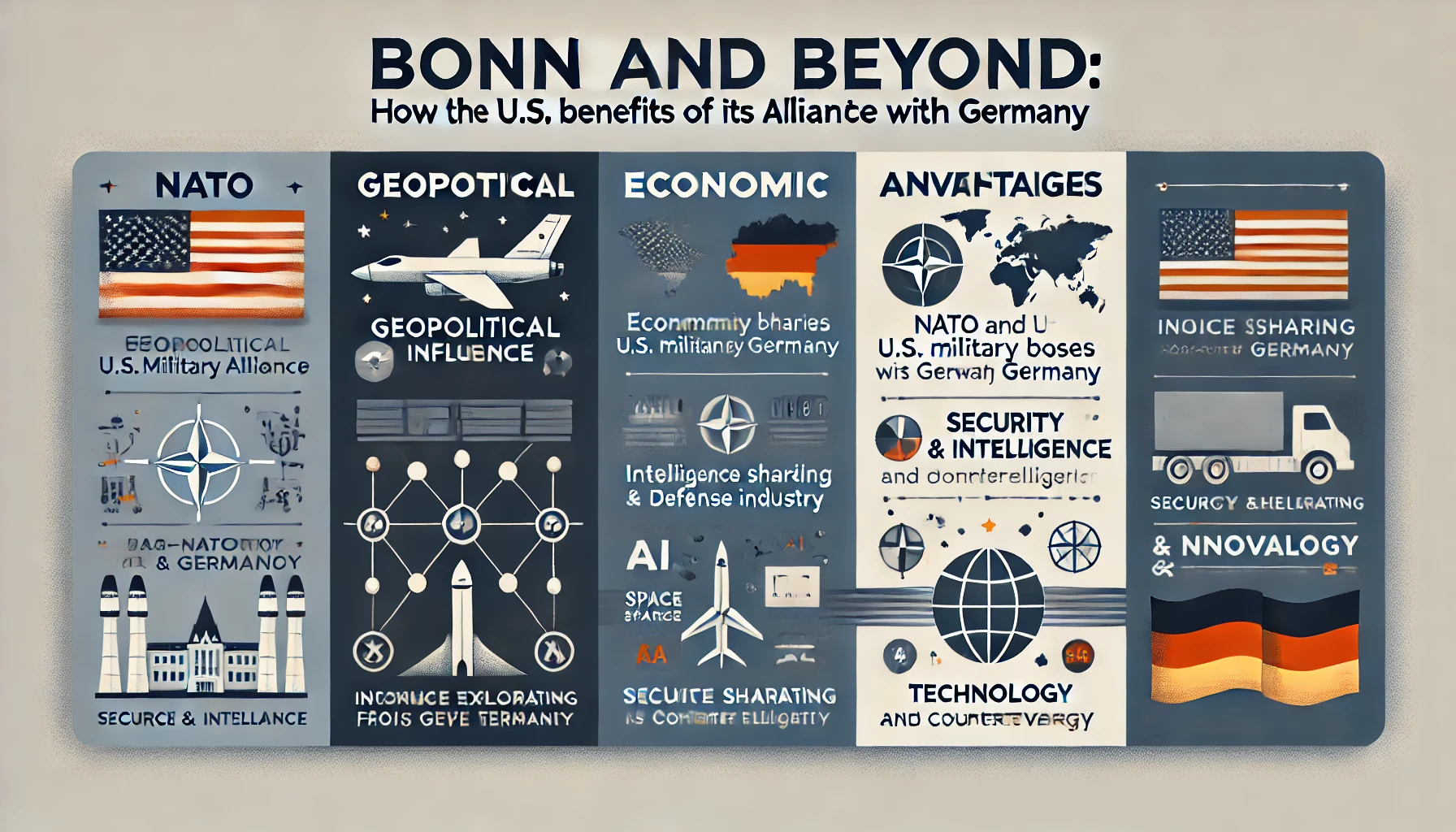After World War II, Germany was occupied by the Allies, with the United States playing a key role. What began as an occupation gradually evolved into a strategic partnership that shaped Germany economically, politically, and culturally. One example of this influence is Bonn American High School (BAHS), which not only served the children of American military and diplomatic families but also became a symbol of the close German-American relationship.
The Benefits of the U.S. Occupation for Germany
Although the U.S. occupation initially brought restrictions and control, it also had significant advantages:
- Democratization and Stability
- The U.S. played a central role in establishing a stable democracy in West Germany.
- The Federal Republic adopted a constitution (the Basic Law) based on American principles of the rule of law and separation of powers.
- Economic Reconstruction
- Through the Marshall Plan, Germany received massive financial aid to rebuild its industry.
- The U.S. occupation helped transform former war industries into peaceful economic sectors.
- Access to Western markets strengthened Germany as an economic power in the long run.
- Security and Protection
- The U.S. military presence guaranteed Germany’s security, especially during the Cold War.
- NATO membership (with the U.S. as the main protective power) prevented Soviet influence in West Germany.
- Education and Cultural Exchange
- American schools, such as Bonn American High School, not only promoted U.S. values but also provided German students and teachers with insights into the American education system.
- Cultural programs and exchange initiatives (e.g., Fulbright scholarships) fostered German-American friendship.
The Role of Bonn American High School
Bonn American High School (BAHS) was an important institution for the American community in Germany from 1952 to 1997. Located in the former capital, Bonn, it was one of several schools established for the children of American soldiers, diplomats, and government employees.
- High-Quality Education: BAHS offered a first-class American education, allowing students to continue their studies seamlessly after returning to the U.S.
- Intercultural Exchange: Although the school primarily served Americans, there were connections with German schools and occasional interactions with the local community.
- Symbol of Transatlantic Partnership: The school represented not only education but also the deep-rooted U.S. presence in Germany and the transition from occupation to partnership.
Conclusion
The American occupation had far-reaching effects on Germany—from democratization and economic growth to security during the Cold War. Bonn American High School serves as an example of the cultural and educational impact of the U.S. presence. Today, it remains a reminder of a time when Germany and the U.S. built a close relationship that continues to this day.
What if the Morgenthau Plan had been implemented?
The Morgenthau Plan was a proposal by U.S. Treasury Secretary Henry Morgenthau Jr. in 1944, which aimed to turn Germany into an agrarian state after World War II in order to permanently deindustrialize it and weaken its military potential. If this plan had been implemented, it would have had significant consequences for Germany, Europe, and the world.
Possible consequences of implementing the Morgenthau Plan
1. Germany as an Agrarian State
- Heavy industries (e.g., coal, steel, and machinery) would have been dismantled or destroyed.
- Germany would not have been able to develop into a leading industrial nation.
- Millions of Germans would have been unemployed or forced to work in agriculture, often under very basic conditions.
2. Massive Population Decline and Famine
- Without industry, Germany would not have been able to provide enough food and resources for its population.
- Historians estimate that up to 30 million people could have died due to starvation or migration.
- Many Germans would likely have fled to other countries, particularly South America or the United States.
3. Weakening of Europe
- After World War II, Germany was crucial for Europe’s economic recovery.
- Without German industry, the Marshall Plan would have been less effective, as there would have been no economic powerhouse in Central Europe.
- Countries like France, the Benelux states, and Italy would also have suffered economically.
4. Stronger Soviet Influence
- A weak German economy might have made the country more susceptible to communism, as the population sought alternatives to poverty.
- The Soviet Union might have taken full control of Germany.
- The Cold War could have played out differently, possibly with a stronger position for the USSR.
5. Impact on the U.S. and the West
- Without German industry, the U.S. would have had fewer economic benefits from trade with Germany.
- NATO might have been weaker, as Germany became a key partner.
- Many U.S. companies that invested in Germany after the war would not have done so.
Why Was the Plan Not Implemented?
- The plan was economically and humanitarianly unfeasible – famine and economic chaos would have led to major problems.
- The Cold War had begun, and the U.S. needed a strong West Germany as an ally against the Soviet Union.
- The Marshall Plan focused on economic recovery rather than destruction.
Conclusion
If the Morgenthau Plan had been implemented, Germany would never have become an economic powerhouse, the EU would have developed differently, and the Cold War would have had a completely different dynamic. Instead of a strong Western alliance, Europe might have fallen into economic chaos and social instability.
Bonn and Beyond: How the U.S. Benefits from Its Alliance with Germany
The United States gains significant advantages from its alliance with Germany and NATO, spanning geopolitical, economic, and military domains. Here are the key benefits:
1. Strategic Influence in Europe
- Military Presence: U.S. bases in Germany (e.g., Ramstein, Stuttgart, Wiesbaden) secure American influence in Europe and beyond. These bases are crucial for U.S. operations in the Middle East, Africa, and Eastern Europe.
- Countering Russia: Germany plays a central role in NATO’s deterrence strategy against Russia, preventing a shift in power towards Moscow.
2. Economic Advantages
- Access to the European Market: Germany is one of the world’s largest economies and a key U.S. trading partner, facilitating investments and economic cooperation.
- Profits for the Defense Industry: Germany purchases U.S. military technology (e.g., F-35 fighter jets), injecting billions into the American defense sector.
- Strong Export Markets: Close economic ties ensure stable supply chains and facilitate the export of U.S. technology and goods.
3. Political Leverage
- Promoting Western Values: The alliance allows the U.S. to reinforce democratic and economic principles in Europe while countering the influence of China and Russia.
- Support for U.S. Global Policy: Germany is a crucial diplomatic partner in organizations like the UN and G7 and supports U.S. sanctions against nations like Russia and Iran.
4. Shared Defense Burden
- Cost-Sharing in NATO: The alliance structure reduces the financial burden on the U.S., as European partners increasingly contribute to defense spending.
- Strengthening Transatlantic Security: A stable and secure Europe means fewer direct threats to the U.S., especially during global crises.
5. Intelligence and Technological Cooperation
- Data and Intelligence Sharing: The U.S. benefits greatly from intelligence cooperation with German agencies (e.g., BND), particularly in counterterrorism and cybersecurity.
- Technology Collaboration: The U.S. and Germany work together in fields such as artificial intelligence, space exploration (NASA/ESA), and renewable energy.
Conclusion
Germany, with Bonn as a historical center of U.S.-German relations, remains a vital economic, military, and political anchor for the United States in Europe. Without this alliance, the U.S. would need to allocate significantly more resources to maintain its global influence. The partnership strengthens U.S. geopolitical control and reinforces its power position worldwide.





Schreibe einen Kommentar